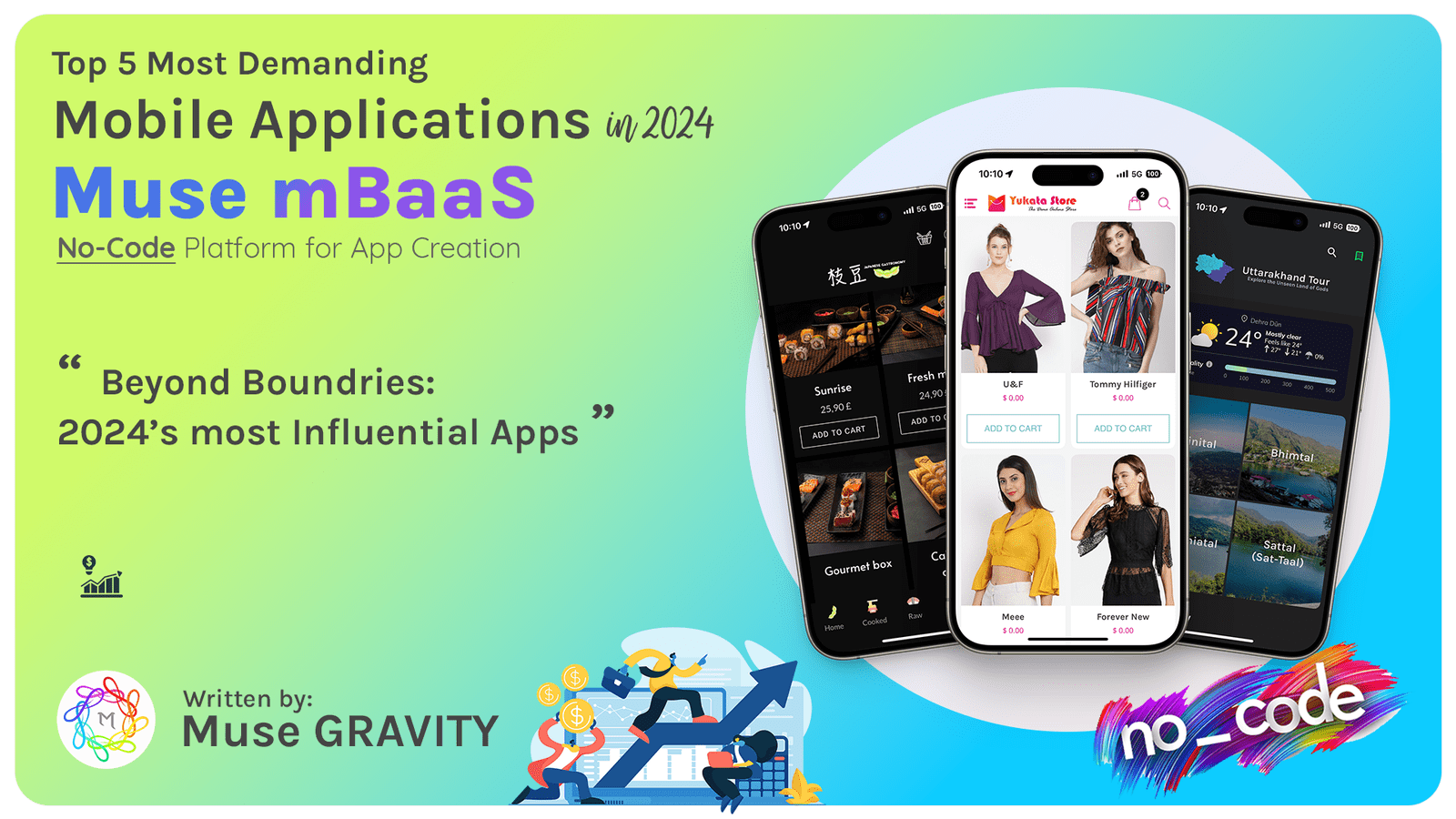
The Digital World is evolving rapidly, and Mobile Applications are at the forefront of this transformation. In 2024, certain Apps have become increasingly prominent, indispensable tools in our daily lives.
Top 5 Most Demanding Mobile Applications in 2024:
1. eCommerce Mobile Apps
Functionality and Features:
- Personalized User Experience: eCommerce apps often use data analytics to offer customized shopping experiences, including product recommendations based on user behavior, search history, and purchase history.
- Secure Payment Gateways: They typically integrate various payment methods like credit/debit cards, digital wallets, and net banking, ensuring safe, secure, and hassle-free transactions.
- Push Notifications: Used for marketing, these Push Notifications keep users informed about new products, sales, and promotions.
- Social Media Integration: This feature allows users to share their favorite products on social media platforms and provides an avenue for influencer marketing.
- User Reviews and Ratings: These are essential for building trust, as they allow new customers to see feedback from previous buyers.
Impact:
- eCommerce Apps have revolutionized the retail industry by making shopping convenient and personalized.
- They've expanded the reach of businesses, allowing them to tap into a global market.
- Such apps have also increased customer engagement and loyalty by offering a seamless and interactive shopping experience.
2. Business Apps
Functionality and Features:
- Project Management Tools: These apps help in task allocation, tracking progress, setting deadlines, and overall project management, facilitating remote and in-office work.
- Communication Platforms: Apps like Slack or Microsoft Teams provide a platform for team communication, including messaging, video calls, and document sharing.
- Customer Relationship Management (CRM) Systems: Apps like Salesforce enable businesses to manage customer data, track sales leads, conduct and monitor marketing campaigns, and provide customer service.
- Document Management and Collaboration: Cloud-based apps allow team members to store, share, and collaborate on documents in real-time.
- Analytics and Reporting Tools: These apps provide valuable insights into various aspects of the business, like sales performance, customer behavior, and financial health.
Impact:
- Business apps have made it easier for organizations to operate efficiently, especially in a post-pandemic world where remote work has become more common.
- They have enhanced productivity by automating routine tasks and streamlining various business processes.
- Such apps have also fostered better collaboration and communication, which are essential in a distributed workforce environment.
3. Food or Restaurant Apps
Functionality and Features:
- Online Ordering and Delivery: These apps allow customers to browse menus, place orders, and have food delivered to their doorstep.
- Loyalty and Rewards Programs: Many apps offer Loyalty Program
- Customer Reviews and Ratings: This feature helps new customers make informed choices based on the dining experiences of others.
- Push Notifications for Deals and Offers: Restaurants use these to inform customers about special deals, new menu items, or events.
- Integration with Social Media: Allowing users to share their dining experiences and reviews on social platforms.
Impact:
- These apps have transformed the food industry by providing convenience and a variety of choices to customers.
- They help restaurants increase visibility, reach a wider audience, and improve customer engagement.
- During the pandemic, these apps were crucial in helping many restaurants survive through online orders and deliveries.
4. Lifestyle Apps
Functionality and Features:
- Wide Range of Services: These can include fitness tracking, travel booking, personal finance management, and more.
- Personalization: Offering personalized experiences based on user preferences and behaviors.
- Social Integration: Many lifestyle apps incorporate social features, allowing users to connect with others who share similar interests.
- Interactive Content: Includes tutorials, guides, and interactive tools to engage users.
- E-commerce Integration: For shopping apps, this includes features like virtual try-ons, wish lists, and secure checkout.
Impact:
- Lifestyle apps cater to various aspects of personal life, promoting convenience, health, and well-being.
- They help users organize and manage their daily activities more efficiently.
- These apps often create communities around shared interests, enhancing user engagement.
5. Educational Apps
Functionality and Features:
- Interactive Learning Modules: Many Educational Apps use interactive content like videos, quizzes, and games to make learning engaging.
- Progress Tracking: Allows students and educators to track learning progress over time.
- Personalized Learning Paths: Customizes the learning experience based on the user's strengths, weaknesses, and preferences.
- Collaboration Tools: Features for students and teachers to collaborate on projects and assignments.
- Access to Diverse Resources: Includes access to a wide range of educational materials, such as e-books, online courses, and educational games.
Impact:
- Educational apps have made learning more accessible and flexible, catering to different learning styles and needs.
- They provide opportunities for lifelong learning and skill development beyond traditional classroom settings.
- During the pandemic, these apps played a crucial role in continuing education during school closures.
Effortless App Creation with Muse mBaaS: your No-Code Solution
Muse mBaaS streamlines app development for various sectors like eCommerce, Business, and Education, offering a No-Code Platform for creating custom apps. Its integrated AI simplifies design while users focus on content. With the capability to develop Progressive Web Apps, Android, and iOS apps from a single backend, it's ideal for non-technical users. Muse GRAVITY's support in App Submission further eases the process, making app development accessible and efficient., Android, and iOS apps from a single backend, it's ideal for non-technical users. Muse GRAVITY's support in App Submission further eases the process, making app development accessible and efficient., Android, and iOS apps from a single backend, it's ideal for non-technical users. Muse GRAVITY's support in App Submission further eases the process, making app development accessible and efficient., Android, and iOS apps from a single backend, it's ideal for non-technical users. Muse GRAVITY's support in App Submission further eases the process, making app development accessible and efficient.
Conclusion
In 2024, mobile apps in eCommerce, Business, Food/Restaurant, Lifestyle, and Education are indispensable, transforming shopping, work efficiency, dining convenience, personal lifestyle, and learning. Muse mBaaS facilitates this transformation by offering a no-code platform, ideal for developing diverse apps without technical expertise. Its integrated AI, capability to handle various app types, and app support submissions make app development accessible and streamlined, underlining its significance in empowering innovative digital solutions in our daily lives.
No Credit Card Required
















